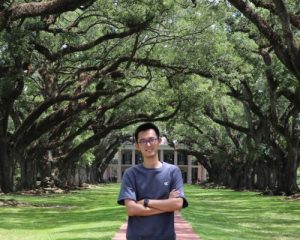Student Spotlight: Tianliang Zhang

1. What are you studying at UT Dallas?
I am a PhD student studying Electrical Engineering. My concentration is optical communication and networks
2. Why did you choose UT Dallas to continue your education?
I was interested in optical communications and got my Bachelor’s and Master’s degree in this area. I feel lucky to have met Prof. Andrea Fumagalli at UTD and had a course with him. He’s a very good instructor and mentor, and he and his students did amazing jobs in their lab. The lab is unique in the US, so I decided to join the lab and pursue my PhD degree.
3. What do you do as a TA to make sure your students are successful?
I think knowing what they know is important. Since I’m also a student, I know very clearly that it is important for the student and the teacher to be in sync. I help them review what they earned and strengthen things that they found difficult. Questions are always welcomed. On the other hand, I think knowing the way to read and think is more important than solving a specific problem, I try to help them understand a problem or knowledge from a different angle to broaden their minds.
4. Do you have any advice that you would give to a student as they transition to virtual education?
First, I think it’s very important for them to have a detailed time plan for studying. Unlike having a course in school, they may have more free time but spend less time in the library searching or studying. Using their time is important, as is making a plan.
Second, they should keep in touch with the instructor or TA closely if they have questions. Sending emails or joining the meeting during office hours is recommended.
Third, I think it’s also a good chance to explore their interested area by self-studying. The UTD library website provides a wide number of links to datasets, such as IEEE Explore.
5. What lessons have you learned during your time as a TA?
I still remember the first time I got admitted as a TA and attending the TA/RA orientation. The head of the department said that if you encounter a problem, you shouldn’t say “I don’t know” and give up. What you should say is “I don’t know, but I will find it out” Sometimes students may ask questions that are out of the scope of the basic knowledge of the course, and I may not be able to answer it right away. I will find the answer and update it to the students next time. I believe that encouraging students to explore is more correct.
6. Tell us about your experience as a doctoral student at UT Dallas.
UT Dallas provides a very convenient environment for doctoral students to study in, such as huge amounts of open source databases, workshops, and very good courses and instructors. In our lab, the professor is a good instructor and mentor. HE always encourages us to explore more, and try things new even if sometimes the result is not always good. The lab environment is good, and we help each other in many aspects. We also have interaction with other labs at UTD, and other labs in the US and the world.
7. Did you have to adapt your PhD studies in response to the COVID crisis? If so, how?
Since my research is highly related to the equipment in the lab, I will come to lab when needed. We have daily health checks and schedule time and registration policies. We are trying our best to keep everyone safe! Other times we will stay at home, write code, and do research. Since we have a campus VPN, we can still visit the devices and obtain experiment results. WebEx provides us the method to still have meetings with professors and other labmates. We are still as productive as we were before COVID!
8. What advice would you give to other doctoral and post-graduate students as they adapt to this new environment?
First, stay safe. Second, make your daily plan. Third, keep in touch with your advisor and your coworkers. Fourth, do not forget the source material provided by UTD at this time, such as online workshops and access to research materials.
- Researchers’ Approach May Protect Quantum Computers from Attacks
- Electrical Engineering Grad Completes Journey with Endless Energy
- Researchers Develop Technology To Protect EVs from Chip ‘Noise’
- Leaders Unite To Reenergize North Texas Semiconductor Workforce
- Welcome Back ECE Students
- Wireless Communications Expert Receives Three Top International Awards




